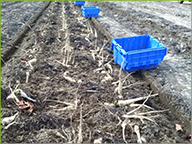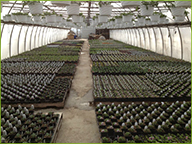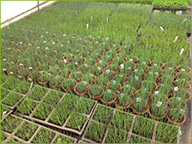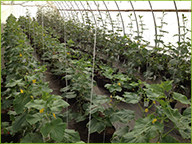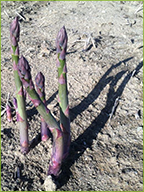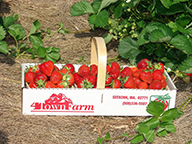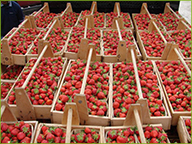- Johnny's Farm Visits & Grower Profiles
- Johnny's 2021 Grower Profiles
- Johnny's 2020 Grower Profiles
- Johnny's Tools Advisor Eliot Coleman: Celebrating Over 20 Years of Partnership | Johnny's Selected Seeds
- Late-Summer Recipe Preview with Farmer-Chef Frank Giglio | Three Lily Farm, Thorndike, Maine
- Johnny's Selected Seeds Visits Martha Stewart's Farm in the Hudson River Valley
- Javier Zamora of Javier Sanchez Medina (JSM) Organics Farms | Royal Oaks, California | Johnny's Farm Visits & Grower Profiles
- Farm Visit: 4-Town Farm, Seekonk, Massachusetts | Johnny's Selected Seeds 40th Anniversary
- Grower Profile: Selwood Green, Walton & Halifax, Nova Scotia, Canada | Johnny's Selected Seeds 40th Anniversary
- Grower Profile: Peach Crest Farm & Cooper Organics, Stratford, Oklahoma | Johnny's Selected Seeds 40th Anniversary
- Farm Visit: Paradise Farms Organics - Homestead, Florida | Johnny's Selected Seeds 40th Anniversary
- Grower Profile: Growing Power Urban Farm - Milwaukee & Madison, WI & Chicago, IL | Johnny's Selected Seeds 40th Anniversary
- Grower Profile: Slegers Greenhouses - Strathroy, Ontario, Canada | Johnny's Selected Seeds 40th Anniversary
- Grower Profile: Gathering Together Farm - Philomath, Oregon | Johnny's Selected Seeds 40th Anniversary
- Grower Profile: Pleasant Valley Farm - Argyle, New York | Johnny's Selected Seeds 40th Anniversary
- Farm Visit: Mark's Melon Patch – Dawson, Georgia | Johnny's Selected Seeds 40th Anniversary
- Grower Profile: Louie's Pumpkin Patch - Skövde, Sweden | Johnny's Selected Seeds 40th Anniversary
- Grower Profile: Living Water Farms - Strawn, Illinois | Johnny's Selected Seeds 40th Anniversary
- Farm Visit: Circle Fresh Farms - Denver, Colorado | Johnny's Selected Seeds 40th Anniversary
- Grower Profile: Freedom Farm - Freedom, Maine | Johnny's Selected Seeds 40th Anniversary
4 Town Farm • Seekonk, Swansea, Barrington & East Providence
40th Anniversary Farm Visit — November 2013
Four Town Farm on the Massachusetts–Rhode Island border is truly a family business. Run by the Clegg family since its inception in 1900, Four Town today keeps seven fourth- and fifth-generation family members working full-time, producing vegetables on 200 acres for their retail farmstand.…
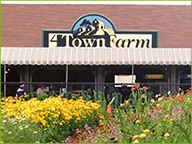
Brad Clegg is the most recent member of the family to come on board, eight years after graduating from the University of New Hampshire and working in the landscape business.
"I came back to the farm because I realized I wanted to eventually be my own boss and use my experience to help grow our family farm," Brad says. He now works with his parents, Steve and Lynne Clegg, aunt Jean Anderson, uncle Tom Clegg, brother Chris, and cousin Waylin.
"For the most part, everyone has their own responsibilities, and we work together on tasks that are labor-intensive, mainly pertaining to crop harvesting," Brad says. Responsibilities include operation of the retail stand, spring flower and vegetable sales, U-pick crops, school tours, land preparation (plowing, tilling, planting), irrigation, greenhouse/high tunnel maintenance, employee management, sales. Everyone pretty much makes their own agenda, and the larger decisions are usually made collaboratively with the family."
Four Town Farm is named for its location, where four New England towns conjoin: East Providence and Barrington, Rhode Island; and Seekonk and Swansea, Massachusetts. While originally run as a wholesale vegetable operation selling to supermarkets, in 1972 the family started up a retail operation that has since become the primary outlet for everything they grow.
The Importance of Record Keeping
With 50,000 square feet of greenhouses and high tunnels, the Cleggs manage to produce food to sell seven months of the year, despite their northeastern locale. The business year commences with plant sales — annuals, hanging baskets, vegetable starts, herbs, and more. Then they move into hothouse tomatoes, strawberries, and asparagus, followed quickly by a huge diversity of vegetables. It is a master feat of planning, scheduling, and record keeping.
"We can't stress how important record-keeping is to the success of a farm," Brad says. "I know keeping records may not be high on a farmer's priority list, but it will make any farmer more successful the following year. It's a lot easier to get from point A to point B if you have directions; records are a farmer's directions for the following year.
"We keep track of many variables, including which varieties do best during specific seasons; which are most resistant to disease; which ones produce the highest yields and best flavor; ease of harvest; types and quantities of fertilizers; types, quantities and frequency of spraying; and timing of plantings, most importantly the earliest and latest (to help maximize yields during the coldest times). Considering the fact that we grow so many different types of crops, most of which within a 75-acre area of our 200-acre farm, it's important to record our planting diagrams so we can easily manage crop rotation from year to year.
Resourcefulness & Diversification
Resourcefulness and a willingness to adapt are two key characteristics of successful growers everywhere. Increasingly here in New England as well as elsewhere, protected cover production allows for extended-season and even year-round production.
"High tunnel and greenhouse production have enabled us to offer high-value crops like tomatoes and cucumbers earlier and later in the season than many other regional farms," says Brad. "This is nice because word spreads quickly these days, especially with social media, and draws people to our farm. Social media platforms like Facebook have been a blessing, because even if we forget to post when things are ready, many of our customers do the posting for us.
"We reuse most of our greenhouse containers from spring tomatoes and cucumbers for winter production of kale, Brussels sprouts, fennel, broccoli, and cabbage and lettuce. This has been great because there is no additional cost; it's all been accounted for from the spring crops, and everything (spacing, drip lines) is still set up. We simply transplant the new plants into the existing soil mass."
The top-selling crops at Four Town Farm have remained the same over the years: strawberries, asparagus, corn, tomatoes, and cucumbers.
In addition to farm-harvested vegetables, the Cleggs run a robust Pick-Your-Own program: strawberries and peas in early June; cut flowers by late June; raspberries beginning the end of July; and pumpkins and a corn maze in fall. School group tours are scheduled throughout October.
A few crops are still produced in quantities to supply large purveyors. These include carrots, corn, butternut squash, white turnips, and cabbage. When the retail market doesn't consume all the produce available, the farm also sells to restaurants and distributors.
Recipe for Success
The Cleggs attribute the success of their farm to two primary circumstances: having excellent soil, and a high population density nearby. But those natural resources are just the basis on which they have built the business. Many other factors are at play.
"We also take pride in the quality of our produce and making sure it's always displayed in a clean, fresh manner," Brad said. "Our retail staff is constantly organizing and replenishing the produce for sale, which maintains a clean and appealing appearance. I think one mistake farmstands can make is underemphasizing the retail end of production; one rotten item can ruin the experience for a customer."
Brad has plenty of sound advice for farmers who want to set up their own retail stores, and much of it is equally applicable to anyone who sells at a farmers' market or through a Community Supported Agriculture (CSA) program. Here's his list:
- Grow varieties that are bred for taste; people can already get mediocre produce from grocery stores.
- Hire a friendly, enthusiastic staff. Employees can make or break your business; they are the front line for the personification of your farm and vital to a customer's experience.
- Maintain a clean, inviting, and fun retail environment.
- People love to see where their crops are coming from, so try to maintain some active fields near your farm stand.
- Ease into the business of farming and retail; do not bite off more than you can chew (manage finances, time, and other valuable resources with care).
- Research your customer base and learn what they are looking for. It may not be exactly what you want to grow, or the easiest crops to grow, but what your customers want and will buy.
- Location. It's important to have a "farm/country setting," but it can't be too inconvenient for your customers to find or they won't come. Parking and access are important; again, if it's too much hassle to get in and out, customers may find somewhere else to go.
Learn More
- To learn more, visit 4 Town Farm's website or Facebook page.
- Images reproduced with permission from Four Town Farms. All rights reserved.
- Browse all of Johnny's 40th Anniversary Farm Visits & Grower Profiles


